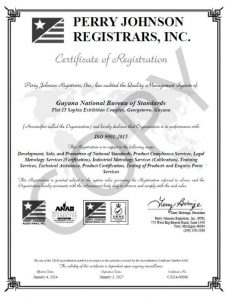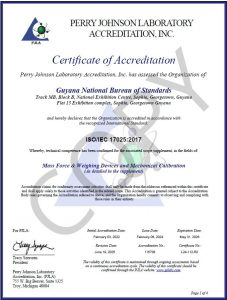As our local economy transforms and expands with new industries, businesses, products and services, the Guyana National Bureau of Standards (GNBS) anticipates the need for more new and relevant standards. Our Standardisation Department is prepared to address proposals for crucial standards once the National Standards Council (NSC) approves them. Last year, twenty-two (22) new and revised standards were approved and published by the GNBS.
GNBS, by virtue of the Standards Act of 1984, is mandated to facilitate the development of standards. The Act provides for the preparation and promotion of standards by the Bureau in relation to commodities, services, processes and practices. Currently, there are more than 500 National Standards available at the Bureau under various categories including Consumer Products, Labelling, Agriculture, Electrical Equipment, Foods, Construction, Tourism, Environment and Energy Management. These standards can be viewed on the GNBS Standards Portal: gnbsguy.com
Standards are documents approved by a recognised body that provides for common and repeated use, rules, guidelines, or characteristics for products or related processes and production methods. Some standards may include or deal exclusively with terminology, symbols, packaging, marking, or labelling requirements as they apply to products, processes, or production methods.
Importantly, standards are developed by consensus or a general agreement by stakeholders these standards may affect. The GNBS has 31 Technical Committees of experts from diverse technical and academic backgrounds who deliberate on the requirements to be included in a developing standard. Additionally, all standards go through a period for public comments and consultations.
The standards development process begins with the completion of a New Work Item Proposal (NWIP) by the proposer. This NWIP documents all information, which justifies the need for a particular standard, and this can be submitted to the GNBS.
The Standards development process comprises of the following steps:
- The completed NWIP and any supporting documents submitted to GNBS are evaluated and assigned priority based on: social and economic importance, stakeholders perceived needs, and future needs, in keeping with National Development Plans and Policies;
- The National Standards Council (NSC) reviews the submission and decides whether to approve or reject the proposal;
- Once approved, research is done to identify whether such a standard exists at other national, regional or international Standard Bodies (e.g. BSJ, BS, ANSI, ISO, IEC, ASTM). If a suitable standard is found it is either 1) Adopted (as is), or 2) Modified. Further, if none is found, further research on the subject is done and a draft is prepared from ‘scratch’ by the assigned Technical Committee.
- The draft standard is prepared and reviewed by a Technical Committee (TC) which comprised of members from government, private sector, consumer, academia, individual and NGOs.
- After the Technical Committee has approved the draft, the draft is advertised for Public Comments for a period of 60 days. Public Consultation sessions are held during this time. In urgent cases, the fast tract method is utilized. The comments period will be reduced to 30 days.
- All the comments received from stakeholders during that period are reviewed by the TC, which determines whether each comment is accepted or rejected (with justification). This is a very important stage in the standards development process since it ensures that manufacturers, importers, consumers, regulators and other interested parties have an opportunity to comment on the proposed requirements of the standard under development.
- A Final Draft is prepared by the TC and submitted to the NSC for approval as a Guyana Standard. Once approved, the standard is published and made available for sale and implementation.
To make a Guyana Standard compulsory, a request along with a justification should be made to the GNBS. The National Standards Council will review the request and once satisfied, it is forwarded to the Minister of Tourism, Industry and Commerce with recommendations for it to be made compulsory.
Minister will take the standard to the Cabinet for its approval and once approved, the decision is published in the Official Gazette. Usually, enforcement commences six months after approval.
The development of standards is very important in ensuring consistency and reliability in the production and delivery of quality goods and services. The GNBS welcomes proposals for the development of new and relevant standards.
For further information, contact the GNBS on telephone numbers: 219-0062, 219-0065 or 219-0069. Please visit our website: www.gnbsgy.org and like our Facebook page: gnbsgy






